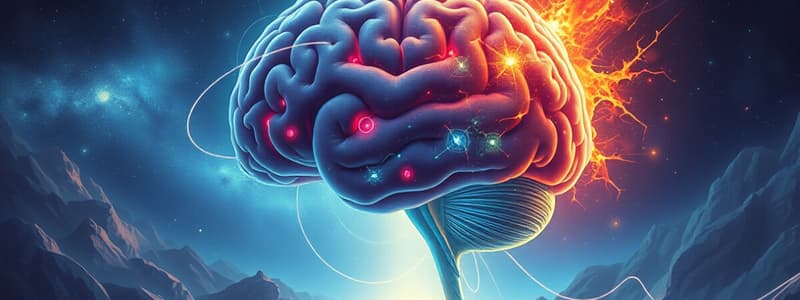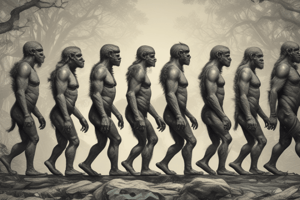Podcast
Questions and Answers
What is the social brain hypothesis?
What is the social brain hypothesis?
Primates and humans have large prefrontal cortexes and large brains because they live in complex and dynamic social groups requiring brain power.
What is ingroup bias?
What is ingroup bias?
- Equal treatment of all groups
- Focus on individual merit
- Favoritism towards own group (correct)
- Bias against other groups (correct)
What does the minimal group paradigm reveal?
What does the minimal group paradigm reveal?
It reveals that people can demonstrate biases and ingroup favoritism with minimal conditions such as being assigned to a group arbitrarily.
The presence of others generally enhances performance, known as ______.
The presence of others generally enhances performance, known as ______.
What is social loafing?
What is social loafing?
Under what conditions is groupthink most likely to occur?
Under what conditions is groupthink most likely to occur?
How did Sherif reduce prejudice in the summer camp study?
How did Sherif reduce prejudice in the summer camp study?
Under what conditions are attitudes more likely to predict behavior?
Under what conditions are attitudes more likely to predict behavior?
Flashcards are hidden until you start studying
Study Notes
Social Brain Hypothesis
- Large prefrontal cortexes and overall brain size in primates and humans result from living in complex social groups.
- High cognitive demands arise from understanding social rules, recognizing potential offenses, and controlling behavior to adhere to group norms.
Ingroup/Outgroup Bias and Outgroup Homogeneity Effect
- Ingroup bias favors members of the same group, leading to preferential treatment in sharing resources and forgiving mistakes.
- Individuals are more likely to hinder outgroup members and mistakenly perceive them as homogenous while recognizing diversity in their own group.
- Example: University of Missouri students perceive University of Kansas students as identical; this bias exemplifies outgroup homogeneity.
Minimal Group Paradigm
- Demonstrates that mere identification with a group, even if randomly assigned, can lead to ingroup favoritism and bias.
- Simple conditions are sufficient for discrimination between groups, shown through experiments like resource distribution favoring one's own group.
Social Facilitation
- Presence of others typically increases individual performance due to heightened arousal.
- Arousal can enhance performance on well-practiced tasks and impair performance on new or complex tasks.
- Example: A well-practiced performer succeeds under observation, while a novice may struggle.
Social Loafing
- Social loafing refers to reduced individual effort in group settings due to a diffusion of responsibility.
- Individuals feel less accountable when outcomes are pooled, as demonstrated in a shouting study where group members exerted less effort.
- To minimize social loafing, establish personal responsibility for tasks and ensure efforts can be individually assessed.
Groupthink
- Groupthink occurs when cohesive groups make poor decisions under pressure and when dissent is discouraged.
- Conditions favoring groupthink include external pressures, affirmations from leaders, and prioritizing group unity over critical evaluation.
- Reducing groupthink requires leaders to refrain from dominating discussions, encourage alternative viewpoints, and carefully weigh pros and cons.
Reducing Prejudice through Cooperation
- Prejudice can be mitigated by fostering cooperation towards a collective goal, as observed in Sherif's summer camp study.
- Competing groups develop animosity, making contact ineffective; shared objectives requiring teamwork can reduce bias.
- Example: Groups worked together to free a truck stuck in mud, fostering unity.
Attitudes Predicting Behavior
- Attitudes that are stronger and personally relevant are more likely to predict consistent behaviors across different situations.
- Specific attitudes also correlate with behavior predictability; personal experiences shape political affiliations, for instance.
Studying That Suits You
Use AI to generate personalized quizzes and flashcards to suit your learning preferences.




